10 Travel Innovations That Made the Modern World Possible
By mentalfloss .com | apr 24, 2017.
Where would we be without the horse, the compass, or the steam engine? Probably right where we started, since we couldn’t go anywhere. These 10 innovations have delivered us from prehistory into today’s global village. For more on these game-changing developments, tune in to National Geographic’s Origins , airing Mondays, 9/8 CST.

1. DOMESTICATED HORSES
In the grand scheme of things, our relationship with the horse is a relatively young one. The exact dates are hard to pin down, but experts believe the first horses were likely domesticated sometime between 4000 and 6000 years ago in northern Kazakhstan. Their arrival revolutionized almost every aspect of human life, from hunting and farming to warfare and exploration. At the time, they were also considered pretty good eating.
2. THE WHEEL
We think of the wheel as the most basic of inventions, yet human society had progressed quite a way before the concept occurred to us. We were making sailboats, metal alloys, and musical instruments in the Bronze Age before we had the technology to craft a symmetrical, smooth axle and pair of wheels. Once we did, though, there was no stopping us; some historians say the idea was likely only invented once but quickly spread throughout the inhabited world.
3. THE COMPASS
The first compasses were used not for navigation, but for divination as Chinese prognosticators in the 2nd century BCE used “south-pointers” to identify ideal locations for rituals. Later, Chinese inventors recognized the navigational value of a north-pointing needle. By the year 1000 CE, compass-wielding Chinese sailors could travel all the way to Saudi Arabia without getting lost.
4. THE LONGBOAT
With a fearless attitude and a few pieces of flexible wood, the Vikings conquered the world. Their longboats were an incredibly elegant improvement on existing ships. They were shallow-bottomed and lightweight, which allowed them to sail up foreign rivers and onto the beach. They were strong enough to sail across the ocean, yet nimble enough to sail close to the wind, creating a literal world of possibility for their dauntless inhabitants.
5. THE STEAM ENGINE
Scottish inventor James Watt often gets all the credit, but the development of the steam engine was the product of many, many minds over hundreds of years. The very first steam engine appears in the writings of the ancient Greek mathematician Hero. Thinker after thinker tinkered with the idea, which went on to power the factories, locomotives, weaponry, and ships of the Industrial Revolution.
6. THE COMBUSTION ENGINE
Our lives today rely on a steady stream of controlled explosions. Historians believe the first combustion engine was designed in the 17th century to use gunpowder as fuel. Needless to say, it did not work out. Subsequent engineers got smarter with their fuel sources, moving next to a mix of hydrogen and oxygen, coal gas, and kerosene before settling on gasoline.
7. THE AIRPLANE
The airplane is the horse of the sky. (Bear with us on this one.) Wilbur and Orville Wright may have had travel in mind when they took their first flight in 1903, but others would soon see the enormous potential of their invention. A mere eight years later, European and American military forces had begun using planes for reconnaissance and the Germans soon developed planes for combat. Before long, planes became airborne farmhands, political tools, and even recreational vehicles.
8. ASSEMBLY-LINE MANUFACTURING
The first automobiles might as well have been spacecraft as far as the average American was concerned. The high cost of painstakingly assembling early automobiles made them rare and prohibitively expensive. But once Henry Ford got his plant up and running, travel by car became first possible, then essential, eventually transforming the American landscape.
9. THE SUBWAY
The thing about cities is that after a while, it becomes hard to find a spare inch to breathe, let alone travel—at least at ground level. Four decades before the first skyscrapers began piling upward, a British inventor by the name of Charles Pearson first proposed heading down. London’s underground rail line opened in 1863, moving a mind-boggling 9,500,000 passengers its first year. Other cities quickly followed suit.
10. CREDIT CARDS
No canny traveling salesman wants to cross unknown parts of the country with his pockets full of cash. Early major credit cards were marketed to this very specific—and, at the time, large—demographic, before entering widespread use in the 1960s. Today, it’s hard to imagine life without them.
8 New Concepts That Are Transforming the Tourism Industry, From Language-Translating Glasses to Emissions-Free Cruising
By Scott Bay

The future of the travel industry is full of bright ideas. Players in tourism, big and small, are making big strides to create more equitable, eco-forward, and all-embracing ways to explore our world—all while taking much greater care of her, and the local communities that we love to visit. From ground breaking technologies to social programs seeking to influence the broader industry, we're spotlighting eight of this year's brightest travel innovations.
Read more about the Future of Travel here .

Silversea Cruises, Silver Nova
Silversea Cruises
Thanks to a mix of hybrid technology, Silversea's Silver Nova will be the first low-emissions luxury cruise ship in the brand's new-build Nova fleet when it launches next July. It will be entirely emissions-free while at port (an industry first), with suites that generate 40 percent fewer greenhouse-gas emissions than the company's previous class of ships.
Proper Hospitality
American hotel brand Proper Hospitality has brought tipping into the 21st century, developing an app system that allows guests to scan the QR codes of eligible employees, carried on their person. No more fumbling awkwardly for cash again.
Alphabet Inc.
One of Alphabet Inc.'s latest bright ideas might break down language barriers for good. While still in the prototype phase, its glasses will translate what you're seeing or hearing in real time, using A.R. technology to project closed-captioning in front of the lenses.
Atlantis The Royal Dubai
Opening this fall, Dubai's Atlantis The Royal used the past to inform its sustainable design: Taking inspiration from ancient courtyards, it's strategically stacked to create shade and foster airflow to its indoor and outdoor spaces, providing natural energy efficiency.
Klawock Cruise Port
Next year Alaska's new Klawock cruise port will start bringing travelers on Oceania Cruises —and new revenue—to a nearby Tlingit village, with locals leading tours and activities.
Niarra Travel
London-based tour operator Niarra Travel is hoping to change industry norms by halving the standard 20 percent commission on bookings and investing the other 10 percent in conservation and communities in the destinations it serves, like South Africa and Costa Rica.
Air4All, a patented system set to hit the market in the coming years, will allow power-wheelchair users to board planes while still in their chairs. The design enables an airline seat to fold up and securely lock in a variety of wheelchair sizes—a game changer for travelers with disabilities who have avoided flying.

Fora Advisor Gaya Vinay
The “sell big or go home” ethos of the travel-agency world is changing with Fora, a free digital platform where amateurs passionate about trip planning can become travel advisors , with access to a training library and tools like an SEO-optimized profile page and automatic commissions collection.
GoldenPass Express
When Switzerland's GoldenPass Express launches in December, connecting Montreux in the west with Interlaken in the east, it will mark the first time that a train will hop between different types of tracks, thanks to a variable gauge bogie that could revolutionize international train travel.
This article appeared in the September/October 2022 issue of Condé Nast Traveler. Subscribe to the magazine here .
By signing up you agree to our User Agreement (including the class action waiver and arbitration provisions ), our Privacy Policy & Cookie Statement and to receive marketing and account-related emails from Traveller. You can unsubscribe at any time. This site is protected by reCAPTCHA and the Google Privacy Policy and Terms of Service apply.
- AI Generator
hospitality
Travel concept, 29,775 travel innovation stock photos & high-res pictures, browse 29,775 authentic travel innovation stock photos, high-res images, and pictures, or explore additional hospitality or hotel stock images to find the right photo at the right size and resolution for your project..
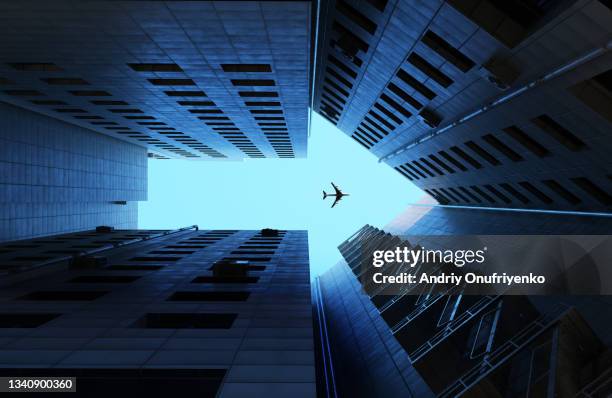
6 Travel Innovations We’ve Covered: Did They Live Up to the Promise?
Rashaad Jorden , Skift
March 16th, 2023 at 8:00 AM EDT
While some of the tech advances Skift featured over the years may not have lived up to expectations yet, others are poised to play an even bigger role in the travel industry in years to come. Check out this list.
Rashaad Jorden
Skift has covered throughout the years dozens of innovations poised to fundamentally alter travel — several of which we featured in a newsletter regularly published in 2017 and 2018 named the Skift Corporate Travel Innovation Report.
Although the report primarily focused on business travel’s changing landscape as well as its future, it included trends and tech advances affecting the travel industry as whole — including airlines, hotels and online travel agencies.
So have those innovations truly been groundbreaking? We take a look at six of them we showcased in the report and examine through our coverage how they’ve impacted the travel industry.
Virtual Reality
Skift repeatedly addressed the impact of virtual reality would have in the travel industry in the Innovation Report, noting that the technology had finally gone mainstream in 2017 . The use of virtual reality was already prevalent in the events industry. Meet L.A. , part of the Los Angeles Tourism & Convention Board, had launched the Virtual Discovery L.A. in 2016, which enabled conference planners to explore event venues throughout the city in virtual reality .
However, virtual reality’s expected boom had been slowed by factors such as costly headsets and lack of content . Even Meta, the parent company of Facebook and Instagram, found that many of its employees didn’t have virtual reality headsets, making them reluctant to use its Horizon Workrooms app that allows users represented by avatars to gather around a conference table.
But some travel companies have increased their investment in virtual reality coming out of the pandemic, including KLM . The flag carrier of the Netherlands began pilot training in November 2020 using virtual reality platforms it built in-house. Meanwhile, New Orleans utilized virtual reality to film an ad from its latest campaign, which Walter Leger III, president and CEO of New Orleans & Company, was part of its strategy to showcase the innovation taking place in the city .
Skift touched on the increased use of biometrics at airports in September 2017 , which business travelers believed could help speed up lines at airports despite concerns about the security of information and its potential use .
Although those issues haven’t died down , biometrics are poised to become even more prominent at airports, with the pandemic helping drive interest in technology that would reduce touchpoints for travelers. Travel tech firm Pangiam bought biometric facial recognition system VeriScan with the belief the platform could reshape travel coming out of the pandemic. Meanwhile, Star Alliance, the world’s largest airline alliance, is calling on half of its 26 members to use biometrics technology by 2025.
Skift listed the use of airport biometrics as a travel tech trend worth watching in 2023 .
Enhanced Baggage Tracking
Skift highlighted American Airlines efforts in July 2017 to improve its baggage tracking infrastructure through the launch of a set of notifications on its mobile app. The technology known as Customer Baggage Notification alerts travelers through the app when checked baggage arrived early or late to the carousel, giving travelers a better idea about the location of their belongings.
Other carriers have enabled travelers to track their luggage’s delivery via their apps. Airlines including Air France, Delta and Qantas have powered the process with radio frequency identification baggage labeling tags, which transmit radio signals with a bag’s identifying number to sensors at airports that track the luggage.
Skift envisioned that robots would automate more procedures in the travel industry by 2025 in a 2021 Megatrend. Chinese hotel groups Huazhu and Homeinns had already invested in ExcelLand, a manufacturer that makes the robots they used to deliver food by room service.
And more hotel companies are poised to deploy robots. Relay Robotics , a company that provides delivery robots to hotel groups including Marriott, Hilton and Radisson, raised $10 million in Series A financing in spring 2022. Eight California hotels owned by Seaview Investors have already hired robot ambassadors that deliver toiletries and dental necessities to guests in five minutes or less.
However, researchers from the Durham University Business School urged hotels not to promote themselves as robot hotels due to the possibility it could create unrealistic expectations. A study they conducted found that while 60 percent of customers experienced joy when dealing with robots in a customer service role, 28 said they felt fear.
Artificial Intelligence
Skift noted in January 2017 that artificial intelligence is turning into a big travel buzzword . Its impact on travel on travel has continued to grow, even potentially reshaping how consumers book hotels . Some call centers turning to an artificial intelligence program to solve consumer complaints about the large number of flight disruptions last year.
Meanwhile, the use of generative AI — a form of technology that includes the creation of images, audio, video and text — is projected to surge, and a growing number of online travel agencies are exploring how to use it. Skift examined how generative AI is poised to impact travel marketing in a 2023 Megatrend. Separately, author David Mattin, an expert on artificial intelligence, said in a special edition of the Skift Podcast that travel brands can use generative AI to create compelling travel marketing copy for TV commercials and Twitter campaigns in seconds.
Singapore-based online travel agency Trip.com has already added a generative AI chatbot to its platform . However, Expedia Group said it would take a cautious approach to using ChatGPT , the generative AI chatbot by OpenAI, while Booking.com is doing likewise regarding its future plans for generative AI.
Mobile Travel Bookings
Skift projected that mobile travel bookings would represent 40 percent of online sales in 2017 , possibly even overtaking traditional computer bookings in the U.S. Then-Booking.com CEO Gillian Tans had said the previous year that mobile bookings on the site would cross the 50 percent threshold by 2018 .
Although mobile bookings have grown among members of Gen X in addition to many millennials — including in Latin America — embracing mobile devices as their primary method for using the Internet, Skift Research found that mobile travel bookings hadn’t yet surpassed desktop bookings in 2022 .
Augmented Reality
Skift projected in October 2017 that augmented reality , which combines GPS and smartphone camera technology to project images and data into the real world, could fundamentally alter the events industry. Although it may not have lived up to its hype , some travel brands have already incorporated augmented reality in their operations. Dubai Tourism has created augmented reality lenses that enables users to photograph themselves against the city’s landmarks, including Burj Khalifa. In addition, Dutch carrier KLM started using augmented reality to help facilitate training for employees coming out of the pandemic.
And augmented reality could help destinations increase visitation at major historical landmarks. Singapore Tourism Board CEO Keith Tan said at the recent ITB Berlin conference that it aims to use the technology to increase its “wow factor ,” including showing travelers the events of World War II at one Singaporean fort.
Skift AI Travel Newsletter
AI coverage across travel sectors that’s focused on separating trendy moves from good ideas – in your inbox every Friday.
Have a confidential tip for Skift? Get in touch
Tags: artificial intelligence , augmented reality , biometrics , generative ai , hotels , luggage , mobile bookings , robots , virtual reality
Photo credit: The use of virtual reality has expanded in the travel industry in recent years. Bradley Hook / Pexels
National Geographic content straight to your inbox—sign up for our popular newsletters here

5 pandemic tech innovations that will change travel forever
These digital innovations will make your next trip safer and more efficient. But will they invade your privacy?
In the 20 months since the COVID-19 pandemic began, technological innovations have gone from futuristic to familiar. These days it’s hard to be out in the world without encountering QR-coded menus or supplying digital vaccine passports.
As the tourism industry—which logged a billion fewer international arrivals in 2020 than 2019—sputters back to life, masks may begin to disappear, but many pandemic-era tech tools will continue to factor into your trips.
“Consumers will come to expect technologies that make them more confident about travel,” says Steve Shur, the president of the Travel Technology Association. “Some of these changes are here to stay.”
In fact, a 2021 Pew Research survey of 915 policy leaders, science researchers, and other experts predicts that, by 2025, our daily lives could be even more influenced by algorithms, remote work, and what some call “tele-everything.”
While novel interventions such as real-time translation devices and facial recognition passport control may make travel safer and more efficient, there are downsides, including concerns about privacy , data security, and biased technology. Here are some of the innovations that travelers will continue to see and use.
Virtual and augmented reality
When the pandemic shut down travel, museums and tourist destinations turned to augmented reality (AR) and virtual reality (VR) to create online exhibits and experiences. While some of these experiences are best seen with a VR headset, most can be enjoyed with just a computer or smartphone.
The Xplore Petra app launched in June 2020, allowing users to “visit” Jordan ’s most iconic archaeological site by projecting a scaled-down version of the ruins. Lights over Lapland, an Arctic travel company, launched a VR experience to show off the Northern Lights using VR headsets or computer screens.
( How virtual reality might change your next trip, even after COVID-19. )
Post-pandemic, VR and AR may enhance actual trips by adding experiences such as a simulated climb up the Matterhorn at Lucerne’s Swiss Museum of Transport . The Hunt Museum in Limerick, Ireland, has a VR attraction in which visitors immerse themselves in “ The Garden of Earthly Delights ,” a 500-year-old painting by Hieronymus Bosch.
The Museum of Natural History in Paris has an AR exhibit that brings visitors face to face with extinct animals in digital form. The National Museum of Singapore has an installation called “Story of the Forest,” where sightseers explore a virtual landscape comprised of almost 70 nature drawings from the museum collection. The Smithsonian Institution’s National Museum of Natural History , in Washington, D.C., has an app that uses AR to show what some of its animal skeletons would look like with skin and muscle over the bones, offering a new view of a collection dating back to the 1880s.
“VR is not going to replace travel and tourism. It is just going to enhance tourism,” says Anu Pillai, who runs the Digital Center of Excellence at Wipro, a technology company.
Crowd control
To help enforce social distancing, cities, airports, and museums tested or rolled out crowd-control technology including Singapore’s roaming, vaguely terrifying robots that announce people are too close together and signs indicating how large crowds are at airport gates . As throngs of travelers return to popular destinations, similar methods and devices may be implemented to prevent overtourism.

In Italy during the pandemic, Venice began tracking visitors using cameras designed to catch criminals. Post-pandemic, it plans to harness them to keep tourist numbers at manageable levels, perhaps in concert with the mayor’s proposal to add electronic gates at major entry points (cruise ship docks, train stations) that can be closed if the city gets overcrowded.
(These tech changes could make your next flight safer.)
“We know minute by minute how many people are passing and where they are going,” Simone Venturini, Venice’s top tourism official, told the New York Times . “We have total control of the city.”
Amsterdam , which also struggles with overtourism, tracks how visitors use Amsterdam’s City Card, a flat-fee pass to museums and public transport. Beach Check UK launched this summer with real-time information on how busy dozens of beaches are along the English coast, guiding travelers away from packed areas.
“Technology can be used to collect data in order to both make better decisions and communicate those decisions,” says Christopher Imbsen, director of sustainability at World Travel & Tourism Council.
UV-C cleaning
Hospitals have used UV-C light to disinfect and kill viruses for more than two decades. Now, indoor public spaces including airports, gyms, and movie theaters are adding UV-C to halt viral spread.
“UV-C is having its heyday right now,” says Peter Veloz, CEO of UltraViolet Devices, which makes UV disinfecting technology.

UV-C has germicidal properties that combat COVID-19 and other nasties, both in the air or on surfaces. Depending on the location, new UV-C installations go into HVACs, on escalator handrails, or through airports and planes via light-equipped robots that disinfect as they go.
If installed and operated correctly, a UV-C system can kill all sorts of bacteria and germs. Even seasonal flu bugs might be zapped before they spread. “COVID-19 could come and go, but what won't disappear are normal pathogens,” Veloz says.
QR codes at restaurants
In the early days of the pandemic, when transmission of the COVID-19 wasn’t yet well understood, restaurants hurried to provide QR codes. The little black boxes of pixelated dots and dashes could be scanned with a smart phone to bring up a menu, let you order from it, and then allow you to pay your bill, all with limited virus-spreading interactions with servers.
While earlier fears that people could catch the virus via menus and other surfaces have been disproven, the codes have proven convenient and will probably stick around, especially with late-pandemic worker shortages.
Such convenience might mean a trade off with privacy, however, since the little codes can potentially gather a large amount of information from users. Some QR programs just take a food order, but others mine data like a patron’s dining history, age, and gender. The restaurant could use that info to send them coupons or event invitations—or sell it to third parties.
“It’s an example of companies exploiting COVID-19 to extend tracking,” says Jay Stanley, a senior policy analyst at the ACLU. “Moving everything to mobile opens people to new ways of tracking and control.”
Travelers should know that QR codes can be hacked; you might scan one, place a dinner order, and wind up compromising your credit card instead. Stanley recommends treating QR codes just as you do links in unknown emails. Either use your phone to look up the restaurant’s menu on the internet or install a protective app like Kaspersky QR Scanner , which will give users a warning if the code isn’t safe.
Contact-tracing tools
Public health groups used contact tracing methods to identify and track down people who were potentially exposed to infectious diseases such as Zika and HIV, and offer counseling, screening, and treatment. These traditional tools were usually based on phone calls to ask individuals about who they were in contact with and to continue researching exposure. The pandemic pushed officials to scale up such efforts and implement new, higher-tech ones to track viral spread and provide information.
For instance, Apple and Google added contact-tracing functions to new smartphone software, allowing users to opt in and get alerts if they come into close contact with an infected person.
(If you must travel during a pandemic, here’s how to protect your health.)
“There’s been a strong recognition about the value of and the important role of contact tracing for infectious disease prevention and control,” says Elizabeth Ruebush, a senior analyst for infectious disease and immunization policy at the Association of State and Territorial Health Officials. “But we’ve never seen it implemented at the scale of COVID-19.”
Other technologies, such as automated texts, viral heat maps and even CCTV with facial recognition could help track other infectious illnesses or make us ready for the next pandemic.
Even with fancy new apps, however, phone calls and personal outreach will still be at the center of public health. “These tools are aimed to enhance, but not replace, traditional contact tracing,” Ruebush says.
COVID-19 has sped up our adoption of technology . The downside is that this may make it even harder to turn off smartphones while on vacation. Then again, wanderlust is now stronger than ever—and getting lost in the moment still hasn’t been harnessed by a digital code.
Jackie Snow is a Washington, D.C.-based writer specializing in travel and technology. Follow her on Instagram .
Related Topics
- INFORMATION TECHNOLOGY AND TELECOMMUNICATIONS
- SCIENCE AND TECHNOLOGY
You May Also Like
Digital mapmaking innovations are revolutionizing travel

New tools offer peace of mind for pandemic travel
Free bonus issue.

The uncanny valley, explained: Why you might find AI creepy

How is your location data really tracked? You’d be surprised.

It’s harder than ever to identify a manipulated photo. Here’s where to start.

Jet lag doesn’t have to ruin your trip. Here’s what you can do

What life in medieval Europe was really like
- Environment
- Perpetual Planet
History & Culture
- History & Culture
- History Magazine
- Mind, Body, Wonder
- Paid Content
- Terms of Use
- Privacy Policy
- Your US State Privacy Rights
- Children's Online Privacy Policy
- Interest-Based Ads
- About Nielsen Measurement
- Do Not Sell or Share My Personal Information
- Nat Geo Home
- Attend a Live Event
- Book a Trip
- Inspire Your Kids
- Shop Nat Geo
- Visit the D.C. Museum
- Learn About Our Impact
- Support Our Mission
- Advertise With Us
- Customer Service
- Renew Subscription
- Manage Your Subscription
- Work at Nat Geo
- Sign Up for Our Newsletters
- Contribute to Protect the Planet
Copyright © 1996-2015 National Geographic Society Copyright © 2015-2024 National Geographic Partners, LLC. All rights reserved
Innovation That Matters
- Become a member
Sign in to view member only content
Username or Email Address
Remember Me

Innovation Snapshot
Top 7 Travel and Tourism Innovations From 2020
Travel has been limited this year, but the creative travel innovations continue. check out our top seven from 2020..
For much of 2020, the COVID-19 pandemic forbade us from visiting other households, let alone travelling to a different location or holidaying abroad. This had a devastating effect on the travel and tourism industry, with its global revenue dropping by a massive 42.1 per cent from 2019.
The impact of this has been manifold, touching communities who rely on tourism for survival, as well as multiple travel companies who have had to shut down. However, the upside of this has been the positive environment impact of travellers and tourists staying put.
Here, we have collected seven of our most creative travel and tourism innovations of the past year. Some seek to help those communities who rely on tourism by providing virtual experiences; some aim to make travelling in the future COVID-proof; and some hope to maintain the positive environmental impact of this year, by helping travel to become more sustainable.

1. A VIRTUAL TOUR OF THE FAROE ISLANDS WITH REMOTE-CONTROLLED GUIDES
Going a bit stir crazy from the lockdown? Missing your travel fix? The Faroe Islands, a Denmark territory, have come up with a way to allow people around the world to go on a self-guided tour of the archipelago. Camera-wearing locals respond to sight-seeing commands from people at home, allowing virtual tourists to control their own route.
Virtual visitors control their tour guide using a free app and have two minutes of control over the guide, who also provides a commentary. After their two minutes are up it is someone else’s turn, although virtual tourists can rejoin the queue for another two minutes any number of times. The tours are available for an hour twice each day, at 2 pm and 5 pm (BST). Guides may be in kayaks, on horseback or hiking around the mountain villages.
The remote North Atlantic islands depend heavily on tourism to augment traditional trades such as fishing and sheep-herding, and this year the Faroe Islands had planned to ramp up tourism with two new 200-room hotels in the capital, Tórshavn. Although the coronavirus pandemic has ended that ambition for this year, the Faroese hope the virtual tourism app will encourage people to come to visit in the future.
Read more about the virtual tour.

2. HOTEL BOOKING PLATFORM OFFSETS 100 PER CENT OF CARBON EMISSIONS FROM HOTEL STAYS
The Denmark-based, hotel booking platform Goodwings offers subscription-based access to more than one million hotels worldwide at wholesale rates. However, Goodwings is more than the average booking site; the company is a B Corp–certified member aiming to turn the hotel industry into a catalyst for sustainable change. With Goodwings, all hotel stays are 100 per cent carbon compensated, supporting people and the planet for free.
Its business model is built on partnerships, with a global network of 100 nonprofit partners in over 40 countries acting as their ambassadors and marketing channels. The money saved on advertising then gets redirected towards projects and people who are actively working towards the SDGs.
Lara Mulady, Head of Communications at Goodwings, told Springwise that “We wanted to take the focus away from radical innovations and instead look at how we could change existing services to make it easier for people to have an impact every day”.
Read more about Goodwings.

3. HOTEL INTRODUCES CONTACTLESS STAYS VIA FREE APP
As part of the company’s coronavirus-related adaptations of services, guests can now enjoy contactless stays at all citizenM Hotel worldwide locations. Free to download, the citizenM app allows visitors to choose a comfortable level of social interaction. All locations within the business’ portfolio are now cashless, and guests use the app to select a room before arrival.
Check-in and check out is completed in-app, and all entertainment and ambient systems in the rooms are controlled via the guest’s smartphone. Additional safety measures installed within the hotels include hourly cleaning of high traffic areas including elevators and the removal of carpets in all guest rooms. Room cleaning service is now opt-in, so visitors can avoid having anyone enter their room during their stay. The app also provides a walking distance search filter and local discounts that highlight nearby attractions.
Read more about the citizenM app.

4. ENERGY-POSITIVE HOTEL TO BE BUILT IN NORWAY
The new hotel, “Svart”, (named after the Svartisen glacier) will be the first hotel to be built after the energy positive “Powerhouse” standard in a Northern climate, producing more energy than it uses. Moreover, it will have a demand for energy that is 85 per cent lower than a typical modern hotel.
Designed by the leading Norwegian sustainable design studio Snøhetta, Svart will be built at the foot of the Svartisen glacier in the unspoiled municipality of Meløy in northern Norway. The hotel was commissioned by Arctic Adventures of Norway, a company operating in the eco-sustainable and naturalistic tourism sector, and plans to be completed by 2023.
The hotel will stand on a stilt construction built with weather-resistant wooden poles that extend several metres below the surface of the fjord. Thanks to its many large windows, the circular-shaped hotel will offer panoramic views of the fjord, providing direct contact with nature. The ring-like shape is inspired by the local architecture of the “fiskehjell” (a wooden structure used to dry fish) and the “rorbue” (a traditional type of seasonal house used by fishermen).
Read more bout the Svart hotel.

5. ‘ORIGAMI’ AEROPLANE SEAT DESIGN COULD HELP MAKE FLYING SAFE FROM COVID-19
French cabin equipment supplier Safran Aerosystems has partnered with British seating designer Universal Movement to create an “Origami” seat that makes partitions around economy-class seats.
The design – which is officially called Interspace Comfort System – features two wings within the seat-back that can be unfolded to offer lateral support and prevent movement, leaving the middle seat of three vacant and creating a privacy barrier between seats.
The concave padded shells, which are the same height as the seat, can be installed on 90 per cent of economy seats, says Safran. Safran Seats executive vice-president strategy and innovation Quentin Munier said he hopes to have the product on the market in the next few months, and the premium-economy concept later in the year.
Read more about the Interspace Comfort System.

6. AN APP FOR MAKING SUSTAINABLE CHOICES WHEN TRAVELLING
It can be difficult to maintain a focus on sustainability when travelling, especially in an unfamiliar place. The French startup Tookki has a solution – a free mobile app that allows users to find environmentally-friendly restaurants, hotels, transport and more.
Tookki vets establishments and activities for their commitment to sustainability before listing them on its site. In addition, users can share places and experiences on the platform by acting as “ambassadors”. Once suggestions are validated by Tookki, the ambassador earns points, which unlocks discounts and other perks in Tookki partner brands’ e-shops.
The Tookki app allows users to search the nearby area for sustainable establishments and includes a map. Details such as opening times and phone numbers are also included. In addition to the app, Tookki also offers ‘green’ experiences, such as zero waste workshops and 100 per cent organic meals. These are intended for companies to use for away days and perks.
Read more about Tookki.

7. NURSING HOME PATIENTS USE VR TO ‘TRAVEL’ AND BOLSTER SPIRITS
Kenta Toshima, a researcher at the University of Tokyo’s Research Center for Advanced Science and Technology Inami-Hiyama Laboratory, has developed VR technology that allows elderly and nursing home patients to travel to places in the world they once visited or wish to see.
The experiment started when, working in a nursing home, Toshima was inspired to take panoramic images and videos with the 360-degree camera, which could be viewed through a VR headset by the care home resident. This idea grew in popularity.
The aim, according to Toshima , is to help and inspire elderly patients who are prevented from travelling due to physical or mental impairments, or who wish to reminisce on past experiences from the safety of their care home.
“The VR experience makes them feel like they are out of the nursing home and can help ease their anxiety and loneliness,” he said in a conversation with Insta360.com, whose camera he used to shoot the panoramas. The process of creating the shots also involved Toshima adding narration and names, to put the viewer at their ease.
Read more about the VR experience.
Written By: Holly Hamilton
20th November 2020

10 Ways Travel Is Getting Better
Sure, it can get aggravating, but here are some innovations that are making it easier and more enjoyable to take a trip
/https://tf-cmsv2-smithsonianmag-media.s3.amazonaws.com/accounts/headshot/randy-rieland-240.png)
Randy Rieland
/https://tf-cmsv2-smithsonianmag-media.s3.amazonaws.com/filer/20121120073107airport-crowd-small.jpg)
Most Americans have already kicked into Thanksgiving mode, looking ahead to Thursday when they’ll sit down with family and friends, pile an unfathomable amount of food on their plates and then sleep it off to the soothing sound of supersized men smacking helmets on TV.
But between now and then madness lies. There will be traffic jams and long security lines and countless other aggravations that will make you wish that this year you had stayed home and opened a can of tuna.
Don’t despair. Believe it or not, traveling is getting easier. Here are 10 innovations that can help you now or give you hope about the future.
1) You’re the one who likes his cranapple juice shaken, not stirred: British Airways is breaking ground in showing passengers how much it knows about them. As part of its “Know Me” program launched last summer, the airlines is using data it has accumulated about its customers to allow flight crews to give them particularly personal service.
For instance, say a person is flying business class for the first time. That would be flagged 0n the crew’s iPads and a flight attendant could offer a special welcome and make sure he or she knew how to use the seat. Or someone who usually flies business class might instead be in coach taking a vacation trip with his family. A crew member might offer a free drink and make a fuss in front of the whole gang. That’ll score some points.
The big question, though, is when does knowing so much a customer slide from solicitous to creepy?
2) People you meet at airports can be so shallow: When they started showing up at a dozen or so airports around the world this summer, greeter avatars were by no means a sure hit. There was some concern that arriving passengers would be creeped out by holograms that go into a 90-second rap on airport info–location of baggage claim, bathrooms, etc.–as soon as anyone comes within 30 feet of them.
But generally the response has been positive, with plenty of passengers reaching for their cell phones to snap shots of these virtual women for the folks back home. And why not? They’re happy to be on a first-name basis. (Hi, I’m Eva…or Paige or Emily or Heather or Carla.) And they no doubt they bring back memories of Princess Leia, only they’re taller, have much better hair and are way too cheery to bring up anything having to do with Death Stars.
3) Because the real adventure starts after you leave the airport: Last year the Australian start-up Rome2rio launched its search engine designed to provide you with all the travel details for any trip–not just airport-to-airport, but door-to-door. So it includes train schedules and prices, driving routes, even ferry times, if that’s part of the journey. And just last month, it came out with an iPhone app that digs up the same info for you.
4) But can it make the cheapest be the fastest?: Madrid-based Amadeus has been in the airfare search business for several years now, but next year it hopes to take a big leap forward in simplifying the process for travelers.
Using a technology it calls Featured Results, it will be able to do a high-speed search of all possible fares between two locations and, in a matter of seconds, provide the top option in three different categories–the cheapest, the fastest, and the most popular.
5) The next best thing to not having a layover: Another tech product that’s been around for a few years is the mobile app GateGuru. It gives travelers the lowdown on the mysterious world beyond the gate–where you can find the best food, the best airport bar, the fastest security lines, a place to get a massage, the ATMs.
Now it’s entered into a partnership with JCDecaux, a company that handles advertising at airports. Which means the GateGuru content will soon be showing up in digital displays in airports. The first will be at Baltimore-Washington Airport.
6) And then you shoot on down to LA: You have to admit that Elon Musk has earned some cred when it comes to transportation. He’s co-founder of Tesla Motors–its Model S was just chosen Motor Trends’ “Car of the Year”–and founder of SpaceX–which last month flew the first commercial resupply mission to the International Space Station.
So when he talks about a transit system that he says could move people from San Francisco to Los Angeles in a half hour, you can’t dismiss him as someone who’s been munching on a bowl of crazy. Musk’s idea is something he calls “Hyperloop,” which he described as a cross between the Concorde and a railgun. Based on the few details he’s provided, it would be some kind of tube vehicle that would be able to leave as soon as you arrive and then get you to SF or LA in half the time a plane would take.
7) While you’re in the neighborhood: Airbnb started out as an online service that hooked up people looking for a place to sleep in another city or country with people willing to have strangers stay over. And it’s grown quickly–it has listings of 250,000 properties in 30,000 different cities around the world.
Now it’s taken a leap toward becoming more of a full-blown travel service by launching guides to the lesser-known neighborhoods where Airbnb clients are more likely to be staying. So far neighborhood guides have been rolled out in New York, Paris, London, San Francisco, Washington D.C., Berlin, and Rio de Janeiro.
8) What did you expect in Vegas, a milk store?: Given the location, this seems long overdue, but now an operation called the Liquor Library is open for business in Las Vegas’ McCarran Airport. It’s just as it sounds, a place where travelers can pick up beer, wine or booze–and not in some duty-free shop, but in a real live liquor convenience store that calls itself a library.
9) Surprise! There’s a Cracker Barrel in your future: Yes, we’d all like to be able to predict the future, but sometimes we’d settle for being able to know what’s off the next exit. That’s where mobile apps, such as Road Ninja, can make your life easier. It not only lets you know what’s up ahead, but you can also call ahead or read a restaurant review, although there’s only so much you can say about Denny’s Grand Slam.
10) What, no free cocktails for the parents?: Early next year, Air Asia will start setting aside a kid-free zone on its flights. And now a California consulting firm, RKS Design, has gone even further by dreaming up how an all-family airline might work.
They’ve named it cAir and it would feature express check-in services, stroller rentals and play lounges to keep the kids amused. The seats would be arranged so parents would face their kids, bathrooms would be large enough for diaper changes, and sound curtains could be pulled around a noisy little tyke. A kid would even be able to pick out a toy to play with during the flight–which parents would have the opportunity to buy if they can’t wrench it from his hands.
For now, it’s only a concept–no one’s sure if you could actually make a business out of the idea.
Video bonus: The Hobbit opens soon and fittingly Air New Zealand has started airing safety videos featuring a few flight attendants who look like they took a detour from Middle Earth. Sit back and relax, my precious.
More from Smithsonian.com
How Bad Is Air Travel for the Environment?
Is the U.S. Out of Love with Cutting-Edge Transit?
Get the latest stories in your inbox every weekday.
/https://tf-cmsv2-smithsonianmag-media.s3.amazonaws.com/accounts/headshot/randy-rieland-240.png)
Randy Rieland | | READ MORE
Randy Rieland is a digital media strategist and contributing writer in innovations for Smithsonian.com.

15 Trailblazing Travel Innovations Shaping the Future
Posted: September 6, 2023 | Last updated: April 7, 2024
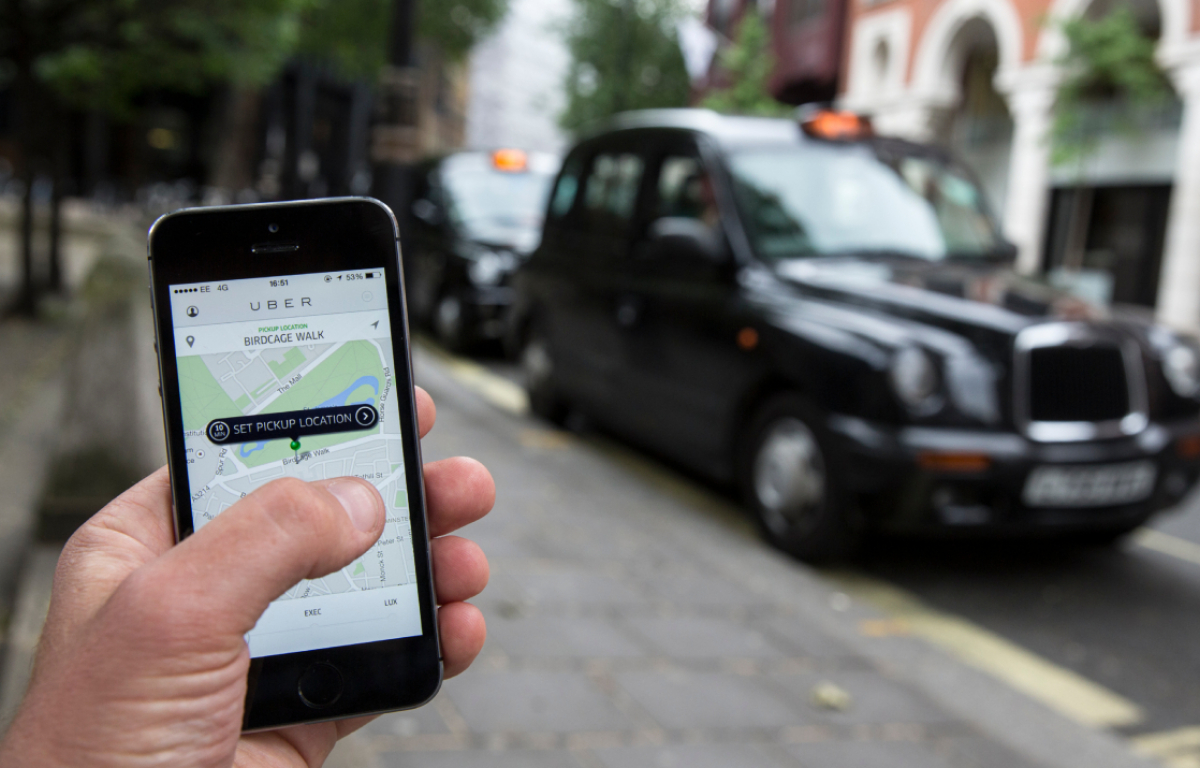
Ride-Sharing Services
The long-awaited alternatives to traditional car rentals and taxis have finally arrived in the last couple of years. Companies like Uber and Lyft have revolutionized transportation with their convenient ways of getting a car to move around a city.
Smartphone apps help travelers request a ride, track their driver’s location, and pay for the service without the need for cash. Pricing models, such as dynamic pricing based on supply and demand, can offer competitive rates, especially during non-peak hours when regular taxis are not available or hard to find in some cities. These companies usually offer safety and transparency by providing driver background checks, vehicle inspections, and real-time tracking of rides.
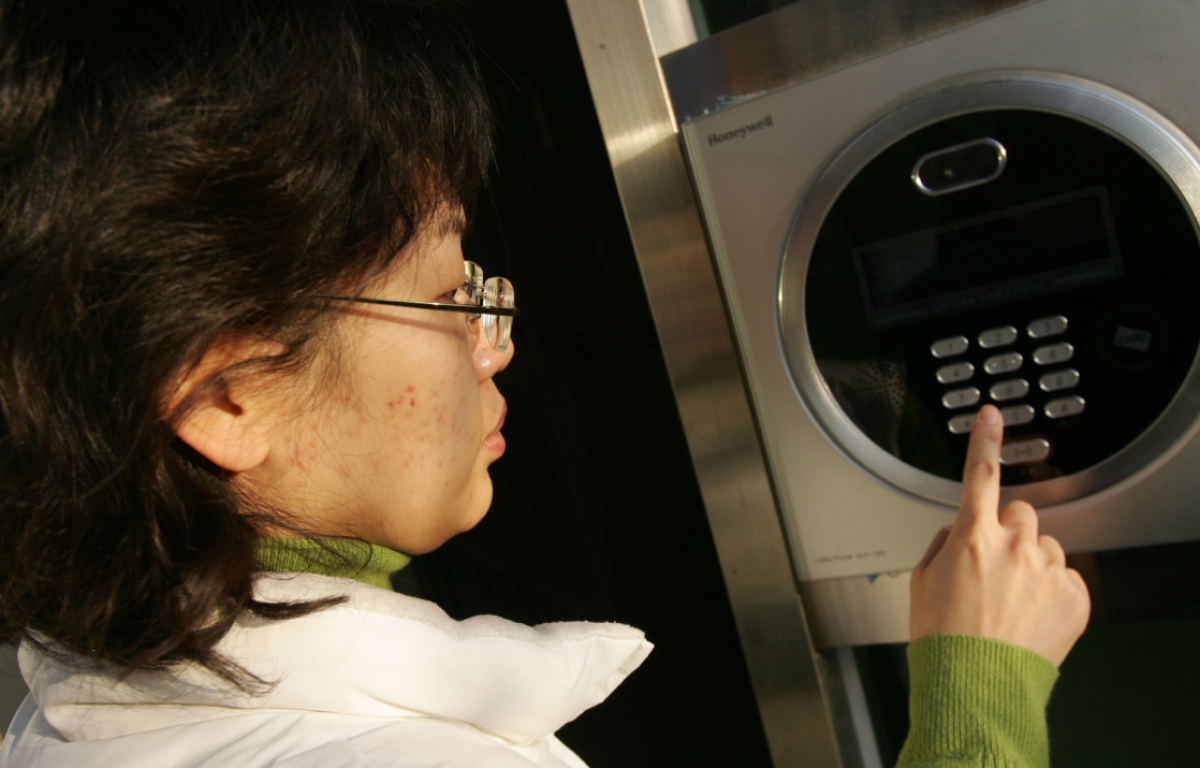

Internet of Things
The Internet of Things (IoT) describes the network of everyday objects connected to the internet via embedded devices with sensors, software, and other technologies. IoT devices have also impacted the travel experience.
Whether it’s smart luggage trackers or hotel room controls, these kinds of devices improve the traveler’s experience and organization. It also helps to ensure safety when traveling with devices such as smart surveillance systems equipped with IoT sensors.
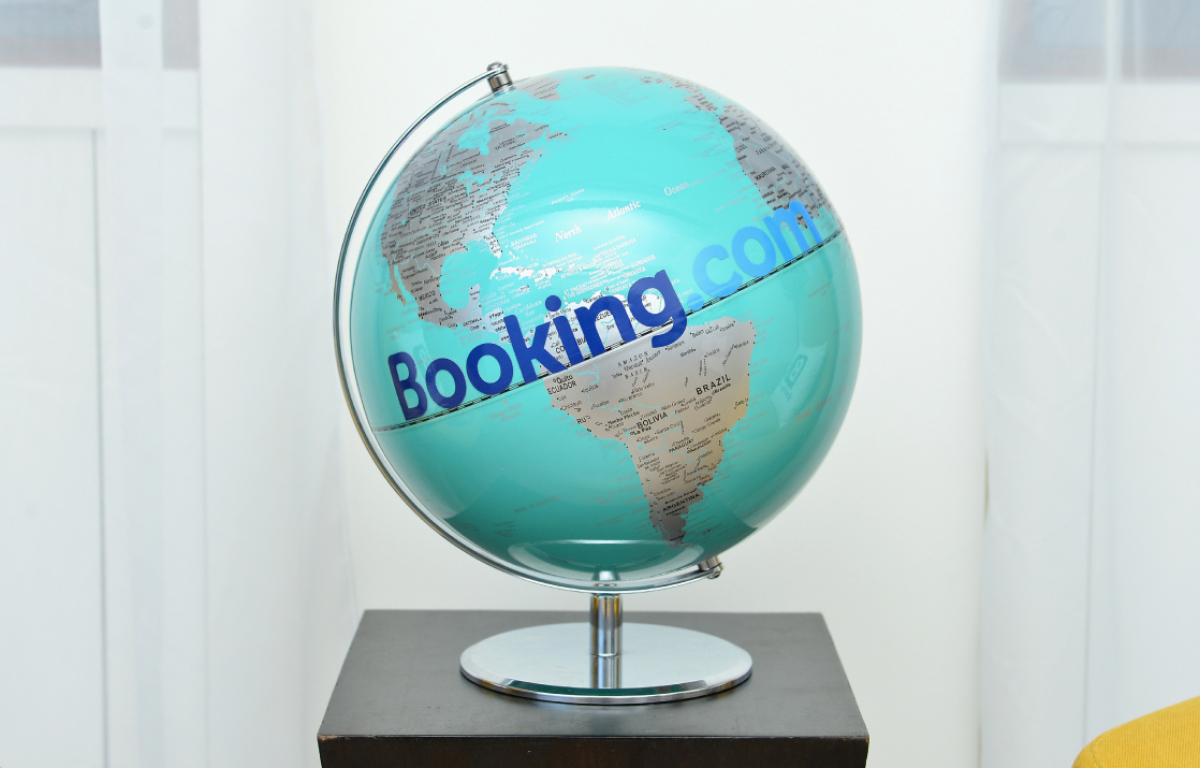
Online Travel Agencies (OTAs)
Online Travel Agencies have resolved many obstacles regarding travel accommodations. Platforms like Expedia, Booking.com, and Airbnb have made it easier to find and book accommodations wherever you go.
Providing a wide range of options and competitive prices, OTAs eliminate the need to visit multiple websites or make many phone calls to organize trips. User reviews and ratings, with 24/7 availability and customer support, have helped travelers get references about possible destinations and accommodations.
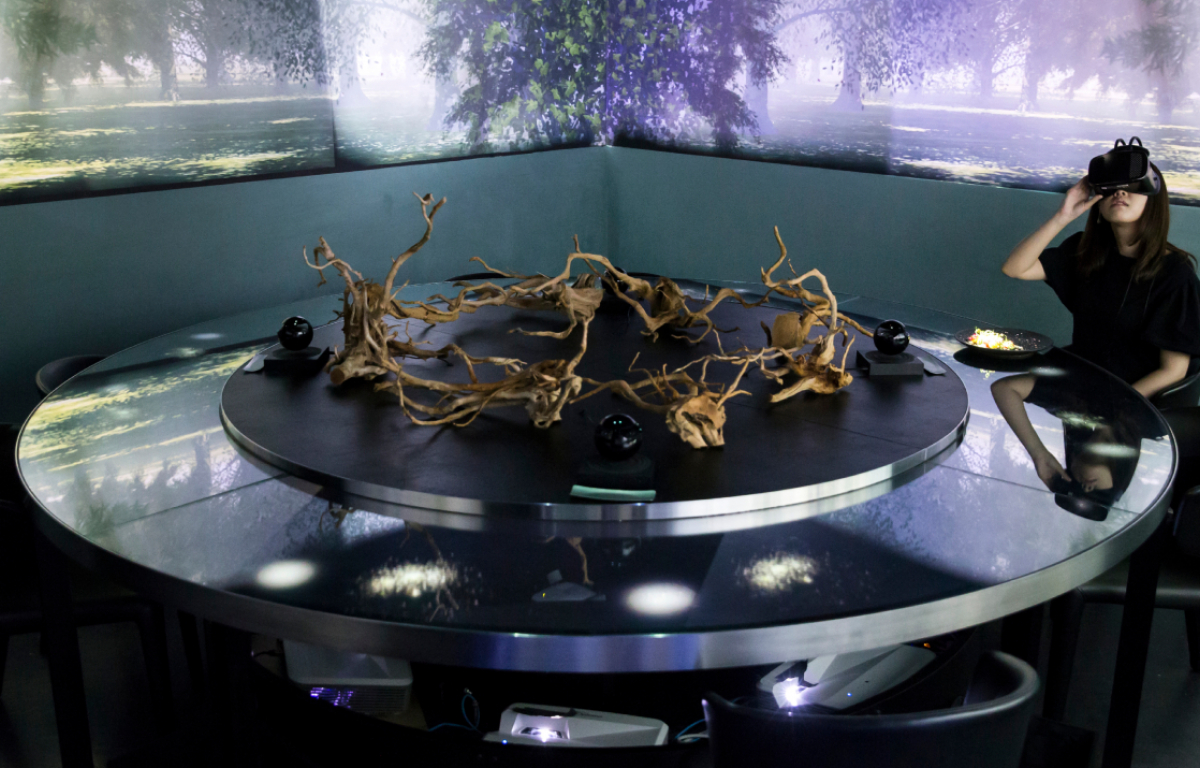
Virtual Reality
Technology has advanced so much that it allows us to travel to a certain place before actually going there. How? Virtual reality allows travelers to go through immersive experiences. Through VR headsets or immersive displays, users can virtually “step into” different locations, allowing them to explore and interact with their surroundings as if they were actually there.
These kinds of experiences can help people take a look at places that they haven’t been able to visit. It also provides helpful information that can help travelers make decisions ahead of their trip.

Travel Sharing Platforms with User Reviews
One of the most important aspects of traveling is trusting the people who are in charge of the transportation, accommodations, tours, and other trip activities. Travel sharing platforms have gained a lot of popularity over the course of the years thanks to the facilities they provide for both parties to connect and interact.
Another key part of travel sharing platforms are the user-generated reviews and recommendations. Platforms like TripAdvisor and Yelp help travelers make informed decisions based on other travelers’ opinions.
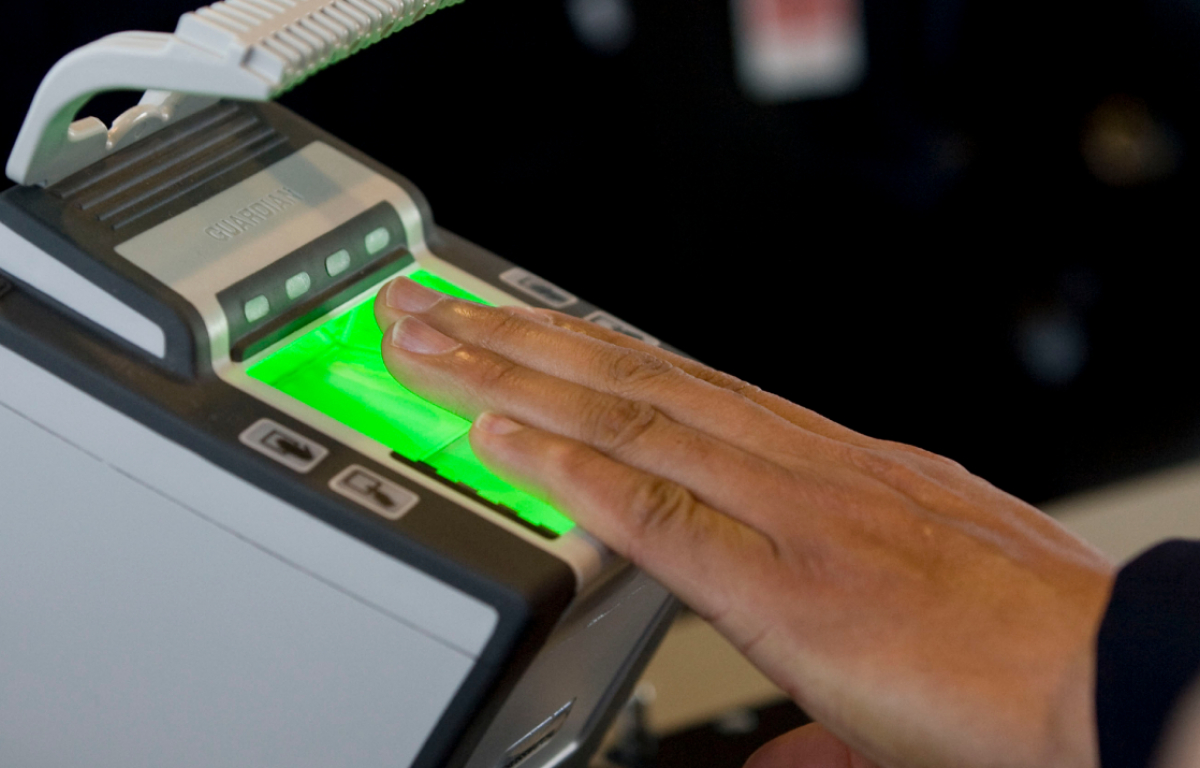
Safety is the number one priority for many people when it comes to traveling. Biometrics have helped make significant progress on that criteria. Biometric technologies like fingerprint scanning, facial recognition, and iris scanning offer a higher level of security compared to traditional identification methods.
Airport security and immigration processes have sped up thanks to biometrics, reducing wait times and eliminating the need for physical documents and manual verification. Biometrics also enable personalized travel experiences by linking individuals’ biometric data with their travel preferences and profiles.

Mobile Apps
The days of using gigantic maps to move around unknown territory on your trips are over. Travel apps have changed the way we organize and manage every journey. It seems like every problem or issue can be easily resolved by just unlocking a smartphone and downloading different apps.
Airlines have their own apps to book flights. Some hotels and activities can also be booked through apps, while car rentals and tickets for other modes of transport can also be secured online. Moreover, any Maps application on smartphones can provide real-time information and even travel guides while spending time far from home.
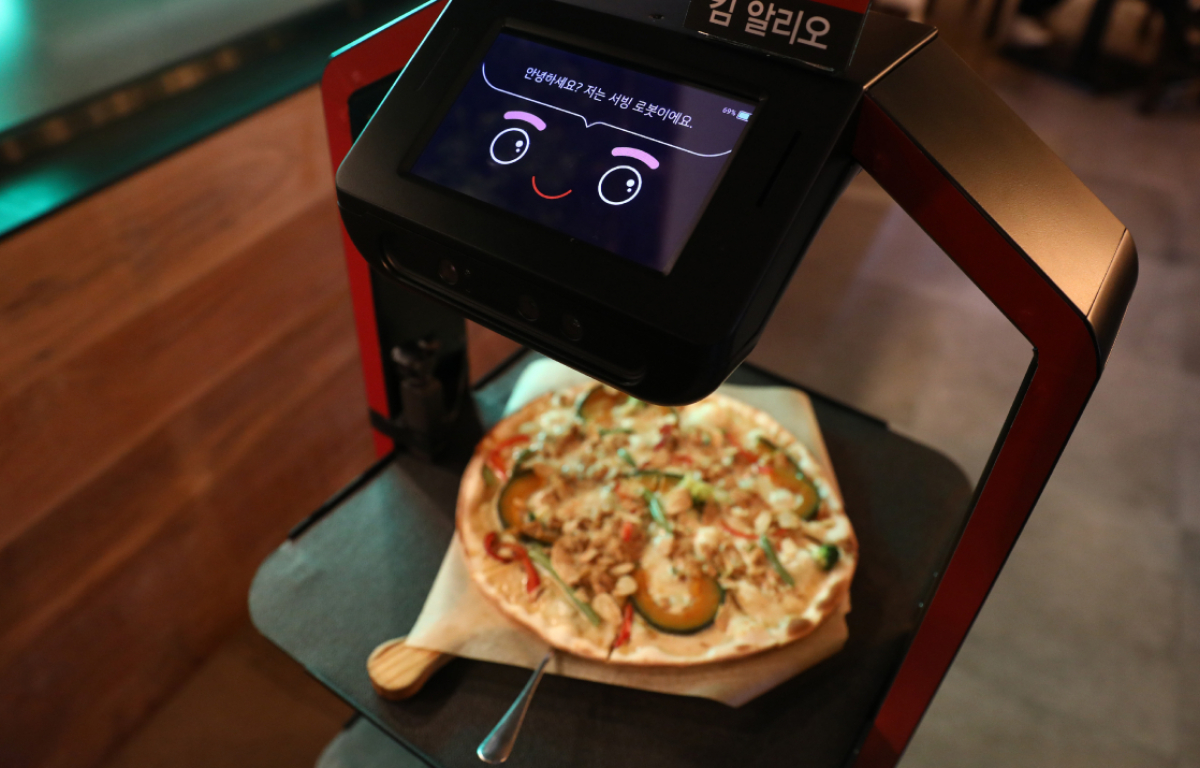
Artificial Intelligence (AI)
The AI takeover is real. Platforms like ChatGPT and Bard are regularly used by Internet consumers. When it comes to traveling, artificial intelligence can be very useful, and these chatbots can be used to provide information and assist with bookings.
AI algorithms can analyze large amounts of data, including user preferences and past travel behavior. Using that data, AI can offer personalized travel recommendations. For businesses in the tourism industry, AI algorithms can analyze market trends and demand patterns to generate selling strategies and offer the best prices to maximize revenue.
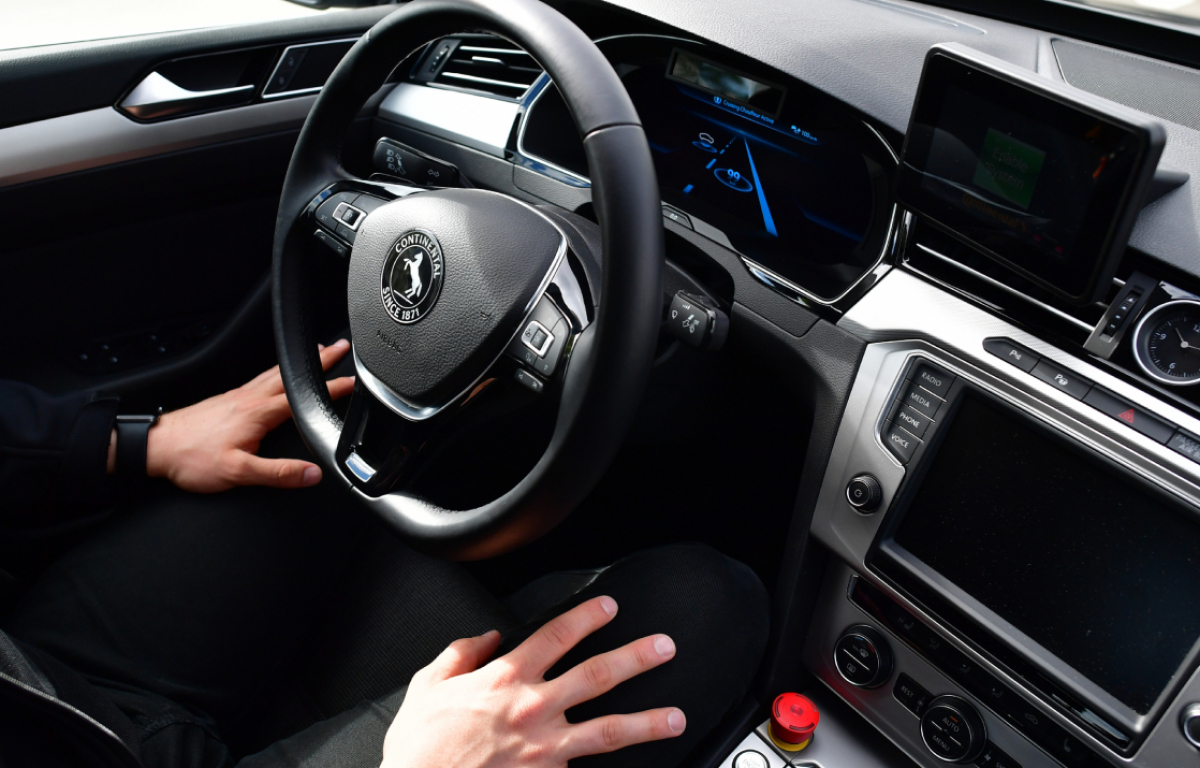
Autonomous Vehicles
While still in the early stages, autonomous vehicles promise to change the way we travel forever. Brands like Tesla and cities like San Francisco have begun experimenting with driverless vehicles. The main advantage of autonomous vehicles is that they can eliminate human error, which is the leading cause of accidents due to distractions, fatigue, or impaired driving.
They detect advanced sensors and cameras and use artificial intelligence algorithms to navigate and make decisions on the road. Autonomous vehicles also have the potential to increase accessibility and mobility for people who cannot drive.

Smart Travel Accessories
Smart travel accessories have solved many inconveniences and issues for travelers. For instance, portable Wi-Fi hotspots or smart travel routers enable travelers to stay connected to the internet while on the go, which is crucial when exploring unknown areas.
Some travel gadgets, like portable chargers, noise-canceling headphones, and smart suitcases with built-in GPS, enhance convenience and optimize travel. These kinds of smart accessories are also used for safety purposes.

In a data-driven modern world, Big Data allows businesses to gather and process large amounts of data from travelers. This allows them to offer personalized travel experiences tailored to individual preferences, customized promotions, and personalized recommendations.
Big data enables businesses to gain a deeper understanding of customer needs and preferences. Business-wise, it analyzes market trends and demand patterns to optimize selling strategies and pricing. It also helps travelers improve their planning and trip management.

Mobile Payment Solutions
Mobile payment solutions have been playing a major role in the evolution of travel. In fact, the globalization of these payment solutions has enhanced travelers’ experiences wherever they go, reducing the need for physical cash.
Many mobile payment solutions are widely accepted globally, allowing travelers to make payments in different countries without dealing with currency exchange or international banking issues. It also provides financial inclusion by providing access to digital payment methods to people who may not have access to traditional banking services while on the move.
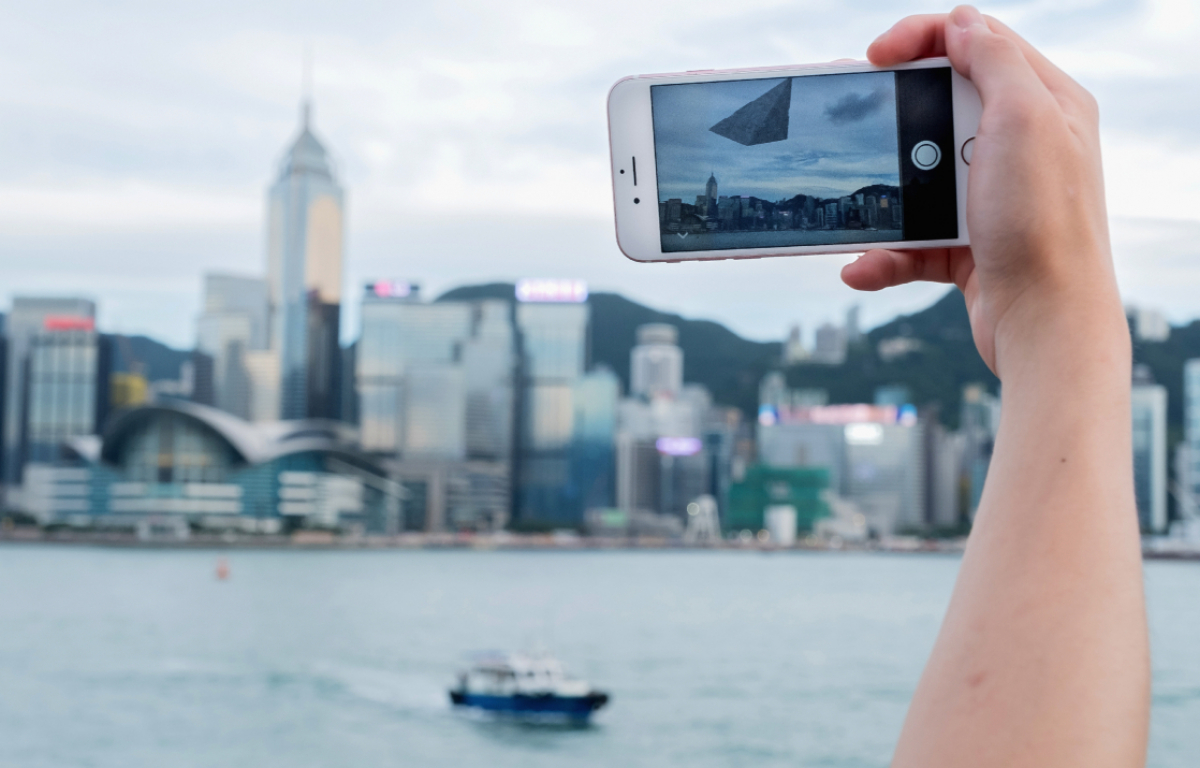
Augmented Reality
Augmented reality apps help travelers by providing real-time information about particular places, attractions, and destinations. AR can help people navigate unfamiliar cities and learn about those places along the way.
Interactive guides, real-time translation, and personalized recommendations are some of the features that AR apps provide to travelers. They improve users’ engagement with the destination where they’re at and provide much-needed information when discovering new places and navigating unknown territories.

When it comes to cybersecurity and transparency, blockchain technology has had a major impact on travel. Passenger identities and booking records are stored on the decentralized blockchain, reducing the risk of fraud, identity theft, and data breaches.
Blockchain technology also helps with payments. In the travel industry, the blockchain eliminates any intermediaries in the payment, like banks, enabling peer-to-peer (P2P) transactions, saving time and transaction costs, and enhancing transparency. It also plays a big part in loyalty programs, with the use of blockchain-based tokens or cryptocurrencies that allow more flexibility in the program’s rewards and can be redeemed through multiple participating travel providers.

Electric and Hybrid Vehicles
In a world where there’s air pollution nearly everywhere, the transportation industry is trying to change that with electric and hybrid vehicles. The quest for environmental sustainability has allowed these vehicles to change the way we travel.
Electric and hybrid vehicles produce lower or zero carbon emissions, helping to fight air pollution, greenhouse gas emissions, and climate change. In that way, sustainable and eco-friendly travel can be achievable in countries that have and produce these kinds of vehicles.
More for You
Russia has found the critical vulnerability in Nato’s American tanks
Trump campaign accused of breaking federal law by hiding millions in legal payments
19 Things People Treat As Safe That Actually Are Pretty Dangerous
Here’s What the US Minimum Wage Was the Year You Were Born
Megan Fox Signs With UTA
Scientists have discovered the maximum age a human can live to
I Lost 100lbs by Following 4 Rules
28 celebrities you probably did not know are nonbinary
19 Things That Will Happen When You Stop Drinking Alcohol
Average US annual salary by age revealed – see how you compare
Young Sheldon star criticises decision to end series: ‘Such a stupid business move’
Scientists finally confirm what lies inside the Moon
Scientists claim people with this blood type more likely to have early stroke
Elliot Page Laments 'Overwhelming Tactics' of Anti-Trans Attacks: 'Just Pushing People Out of Life'
Major Steakhouse Chain Closes 41 Locations
Age at which you're officially old has changed
How Much Beer You'd Have To Drink To Equal A Single Shot Of Liquor
I’m a Bank Teller: 3 Times You Should Never Ask For $100 Bills at the Bank
Why You Should Be Putting Aluminum Foil Behind Your Router
Lost Planet Theia Is Hidden Inside the Earth, New Study Says
- Discovery Platform
- Innovation Scouting
- Startup Scouting
- Technology Scouting
- Tech Supplier Scouting
- Startup Program
- Trend Intelligence
- Business Intelligence
- All Industries
- Industry 4.0
- Manufacturing
- Case Studies
- Research & Development
- Corporate Strategy
- Corporate Innovation
- Open Innovation
- New Business Development
- Product Development
- Agriculture
- Construction
- Sustainability
- All Startups
- Circularity
- All Innovation
- Business Trends
- Emerging Tech
- Innovation Intelligence
- New Companies
- Scouting Trends
- Startup Programs
- Supplier Scouting
- Tech Scouting
- Top AI Tools
- Trend Tracking
- All Reports [PDF]
- Circular Economy
- Engineering
- Oil & Gas
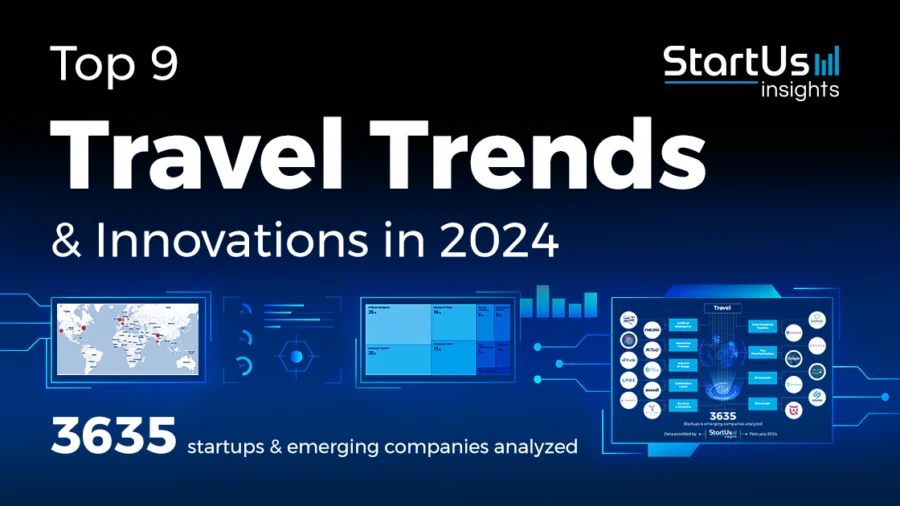
Share this:
- Click to share on Facebook (Opens in new window)
- Click to share on Twitter (Opens in new window)
- Click to share on LinkedIn (Opens in new window)
Top 9 Travel Trends & Innovations in 2024
How are the latest trends in the travel industry reshaping trip planning and enhancing tourist experiences in 2024? Explore our in-depth industry research on the top 9 travel trends based on our analysis of 3500+ companies worldwide. These trends include AI, immersive tourism, IoT, contactless travel & more!
Technological advancements in the travel industry meet the growing demand for personalized experiences, safety, and sustainability. Post the COVID-19 pandemic, emerging travel trends mark a shift towards contactless travel through digital payments, self-check-ins, and more. Additionally, artificial intelligence (AI), the Internet of Things (IoT), and blockchain are automating various hospitality and travel-related operations.
For instance, smart hotels make use of internet-connected devices to remotely control rooms. Further, businesses offer virtual tours by adopting extended reality (XR) technologies like virtual reality (VR) and augmented reality (AR). Travel companies also leverage data analytics to personalize marketing. At the same time, traveler assisting solutions like chatbots and voice technology aid them in booking accommodation and optimizing journeys. These travel trends improve the overall profitability of the tourism industry and enable it to make operations more sustainable and safe.
This article was published in July 2022 and updated in February 2024.
Innovation Map outlines the Top 9 Travel Trends & 18 Promising Startups
For this in-depth research on the Top 9 Trends & Startups, we analyzed a sample of 18 global startups and scaleups. The result of this research is data-driven innovation intelligence that improves strategic decision-making by giving you an overview of emerging technologies & startups in the travel industry. These insights are derived by working with our Big Data & Artificial Intelligence-powered StartUs Insights Discovery Platform , covering 2 500 000+ startups & scaleups globally. As the world’s largest resource for data on emerging companies, the SaaS platform enables you to identify relevant startups, emerging technologies & future industry trends quickly & exhaustively.
In the Innovation Map below, you get an overview of the Top 9 Travel Trends & Innovations that impact travel & tourism companies worldwide. Moreover, the Travel Innovation Map reveals 3 500+ hand-picked startups, all working on emerging technologies that advance their field.
Top 9 Travel Trends
- Artificial Intelligence
- Immersive Tourism
- Internet of Things
- Contactless Travel
- Big Data & Analytics
- Post-Pandemic Tourism
- Tour Premiumization
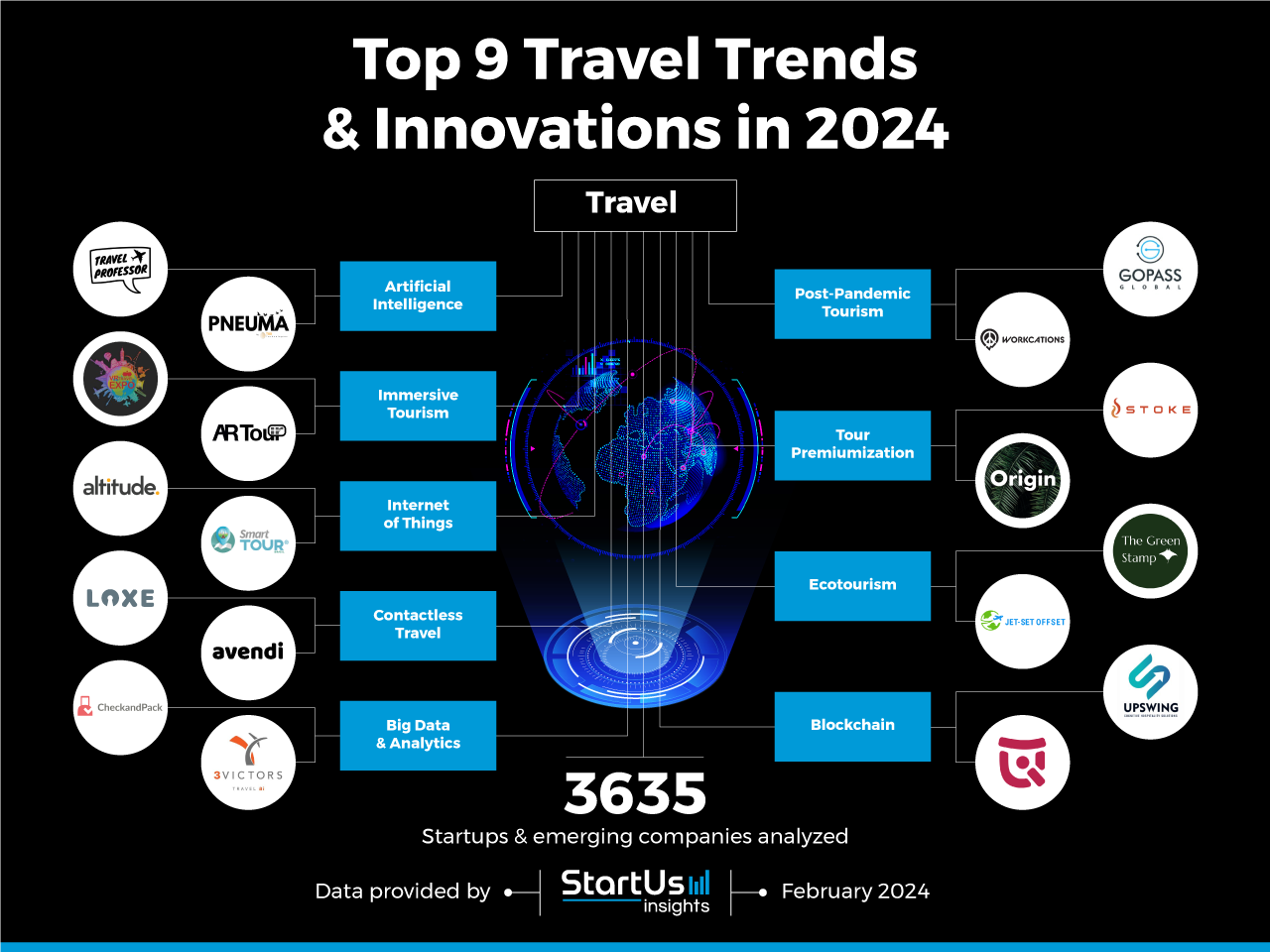
Click to download
Tree Map reveals the Impact of the Top 9 Travel Trends
Based on the Travel Innovation Map, the Tree Map below illustrates the impact of the Top 9 Travel Industry Trends in 2024. Startups and scaleups are enabling contactless travel using technologies like biometrics, radio-frequency identification (RFID), and near-field communication (NFC). This is due to increasing health and hygiene concerns post the pandemic. The use of AI in tourism ensures hassle-free trip planning while AR and VR allow tourists to virtually visit various locations and excursions. IoT increases visibility into tourism industry operations and allows passengers to track their luggage more efficiently. Further, the demand for personalized and luxurious travel is rising. Several startups enable recreational space travel as well as offer sustainable travel options to passengers.
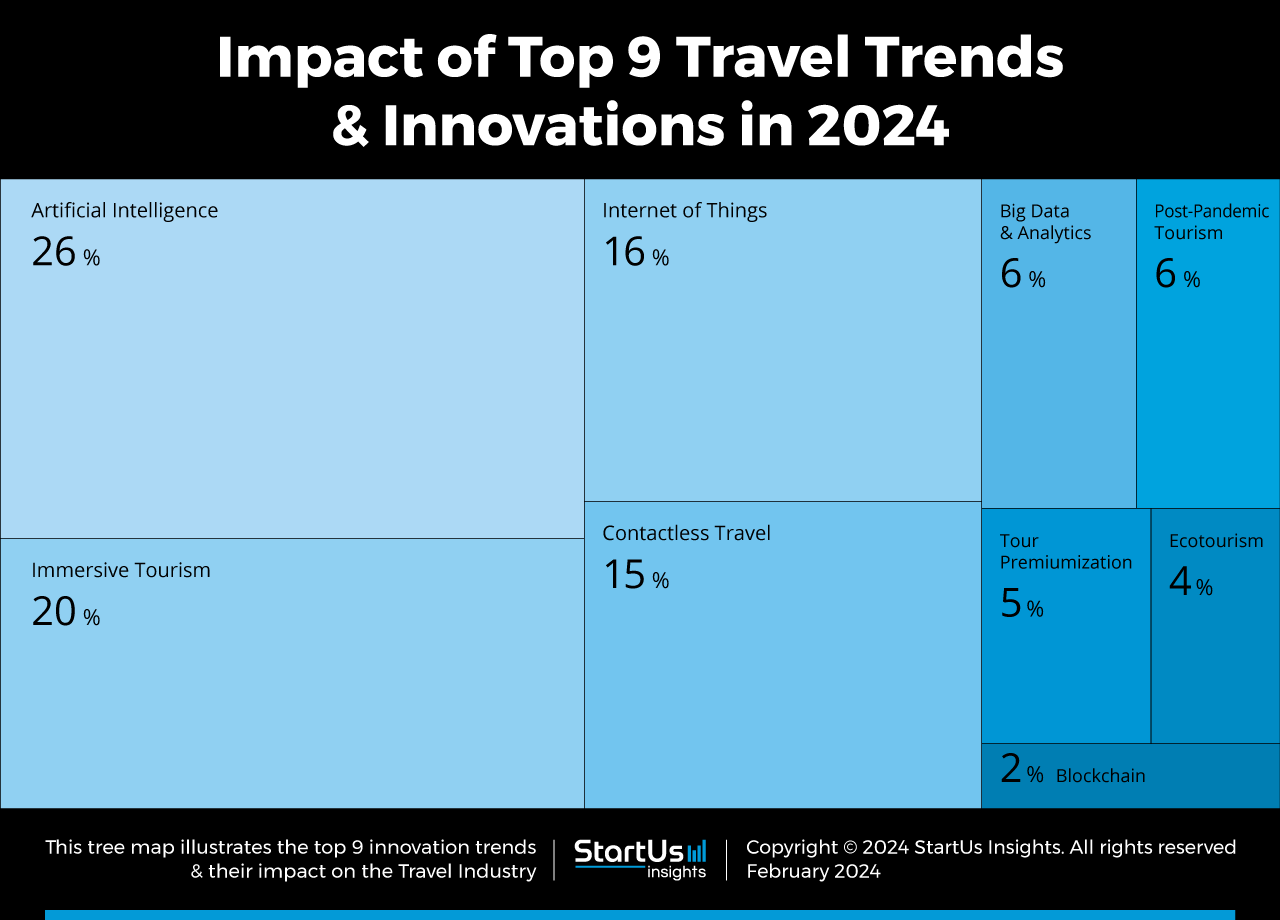
Global Startup Heat Map covers 3 635 Travel Startups & Scaleups
The Global Startup Heat Map below highlights the global distribution of the 3 635 exemplary startups & scaleups that we analyzed for this research. Created through the StartUs Insights Discovery Platform, the Heat Map reveals that the US, Europe, and India see the most activity.
Below, you get to meet 18 out of these 3 635 promising startups & scaleups as well as the solutions they develop. These 18 startups are hand-picked based on criteria such as founding year, location, funding raised, and more. Depending on your specific needs, your top picks might look entirely different.
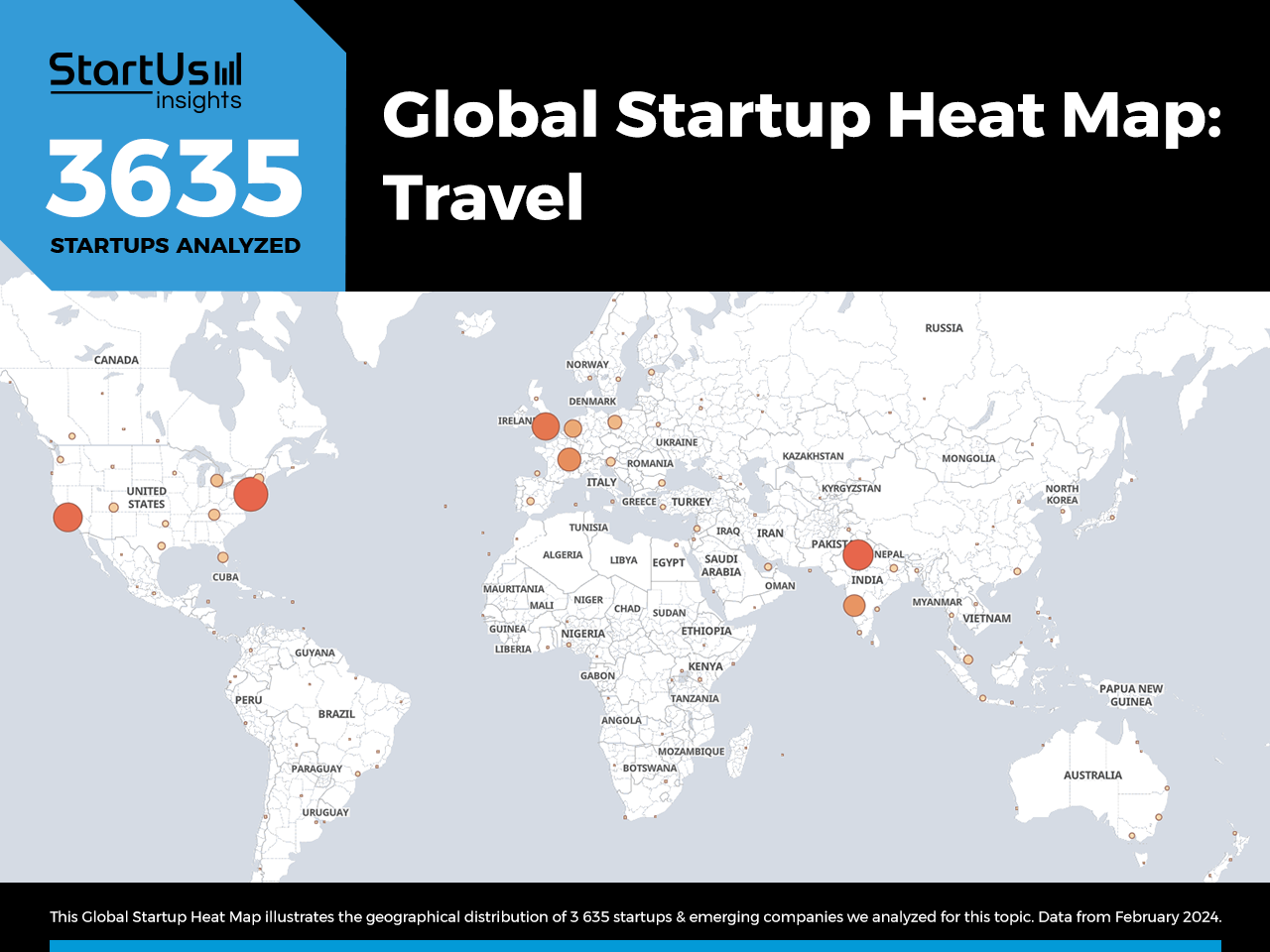
Interested in exploring all 3500+ travel startups & scaleups?
Top 9 Travel Trends in 2024
1. artificial intelligence.
Hotels employ intelligent chatbots, powered by AI, to provide quick and personalized responses to traveler inquiries. These chatbots simplify the booking process and gather customer reviews, aiding potential travelers in making informed decisions. Moreover, AI-based robots enhance the customer experience by automating hotel disinfection and delivering room service.
At airports, these robots guide travelers and assist with luggage handling. Facial recognition technology, driven by AI, expedites identity verification at airports, enhancing security and offering a swift alternative to traditional methods. Startups are developing AI-powered trip planning solutions, optimizing journeys, and personalizing travel experiences.
Travel Professor develops a Travel Chatbot
UK-based startup Travel Professor offers an AI-enabled chatbot for travelers. The startup’s chat widget software monitors multiple flight deals and notifies users when their preferences match. It also provides travel destination recommendations and flight price alerts. This allows travelers to book economical flights and have a budget-friendly tourism experience.
Pneuma Travel facilitates Travel Planning
US startup Pneuma Travel develops a voice-assisted digital agent, Sarah , to streamline the process of travel planning. This assistant, powered by AI, excels in arranging flight and accommodation bookings and assists travelers in discovering a variety of activities. Sarah , available round the clock, provides continuous support for all travel-related inquiries.
Moreover, Sarah customizes travel options according to individual preferences and budgetary constraints. The agent further enhances the travel experience by providing insights into local attractions in unfamiliar cities. Importantly, Sarah enables real-time modifications to travel plans, in compliance with specific airline policies, thereby minimizing waiting times for users.
2. Immersive Tourism
Immersive tourism caters to the growing demand for meaningful experiences among travelers, leveraging AR, VR, and mixed reality (MR). VR simulates original locations through a computer-generated environment, allowing tourists to virtually explore destinations. It provides travelers with a comprehensive 360-degree tour of points of interest.
AR enhances the travel experience with interactive elements such as navigation maps and ads. Travel companies employ AR and VR-based gamification to heighten tourist attractions. Moreover, these technologies enable hotels and resorts to present amenities and rooms in an engaging, interactive manner.
VR Travel Expo offers VR-based Travel Plans
US startup VR Travel Expo develops a VR travel application to transform the way people research and book travel. The application enables users to plan their vacations more efficiently. It provides an engaging platform for users to explore and expand their knowledge of the world. Moreover, it employs 3D geospatial technology that creates real-time digital twins of the world. This further enhances the travel planning experience.
AR Tour makes AR Glasses
Italian startup AR Tour offers AR-powered tours. The startup’s AR glasses superimpose reconstructed images of archaeological ruins to show how the site originally was. Its tour informs the tourists about the site’s history and significance via an audio-visual package. Moreover, the startup designs lightweight AR glasses to prevent motion sickness among tourists, improving convenience.
3. Internet of Things
IoT generates ample data that tourism companies leverage to personalize services in their subsequent visits. Hotels use IoT sensors to enable smart rooms that automate room lighting, temperature, and ambiance control, enhancing guest comfort. These sensors adjust appliances in vacant rooms, conserving energy and reducing the building’s carbon footprint.
Startups harness IoT to deliver location-specific information to customers, including real-time luggage tracking via IoT tags, minimizing lost items. Airlines also incorporate IoT-based solutions into seats, monitoring passenger temperature and heart rate for proactive health management.
Altitude enables Smart Hotels
New Zealand-based startup Altitude creates an IoT-based hotel software and hardware to develop smart hotels. The startup makes self-service kiosks to automate reservations, room up-gradation, payments, as well as check-in and check-out. Its hotel management platform further enables contactless engagement with guests. Additionally, Altitude’s mobile keys allow guests to open doors using mobile phones, providing convenience and saving time for travelers.
Smart Tour provides Smart Itineraries
Brazilian startup Smart Tour offers smart itineraries using IoT and quick response (QR) codes. The startup recommends travel routes and destinations based on the user’s preference in real-time. This facilitates a seamless experience for travelers. Besides, the user-generated data enables tourism managers to better understand consumer behavior and indulge in proximity marketing. The startup also offers a contact tracing solution to monitor COVID-19 infected travelers and ensure public safety.
4. Contactless Travel
Travelers benefit from contactless recognition technologies like retina scanning, which replace traditional travel documents, speeding up passenger identification and reducing airport queues. QR codes offered by travel companies allow tourists to access relevant information on their mobile devices, enhancing engagement.
Hotels have introduced contactless self-check-ins, enabling visitors to arrange services before arrival. Additionally, contactless payment modes are available in hotels and restaurants for swift and secure transactions. Moreover, wearable devices are transforming the travel experience by providing real-time notifications and touch-free access to services and information.
Loxe designs Smart Hotel Keys
US-based startup Loxe makes smart mobile keys for hotels. The startup’s smartphone app replaces key cards with contactless mobile keys that allow users to unlock doors using smartphones. It also reduces operational costs incurred in the manufacturing of conventional keys or plastic cards. Moreover, the startup designs a Bluetooth retrofit module that converts normal door locks into mobile-ready door locks. This allows hotel owners to easily convert their existing locks into smart ones without additional expenses while improving guest safety and convenience.
Avendi provides Contactless Payment
Singaporean startup Avendi offers contactless and cashless payments for travelers. The startup allows tourists to accumulate expenses throughout their trip and pay at the end of the journey. Avendi’s app utilizes QR codes to add all the billed expenses and shown through its dashboard. The user settles the tab amount in the preferred currency, preventing the inconvenience of cash withdrawal or credit card payments.
5. Big Data & Analytics
Big data empowers travel companies with customer trends for strategic marketing. Analyzing traveler behavior, they offer tailored recommendations for hotel bookings, cab hires, flight reservations, and ticket purchases.
Predicting future demand is another advantage of big data and analytics, helping hotels and airlines identify peak periods to optimize revenue. Advanced analysis of transactional data aids in detecting cyber fraud, and safeguarding sensitive customer information such as credit card details and biometric data.
CheckandPack creates a Travel Platform
Dutch startup CheckandPack offers a big data travel platform. It runs marketing campaigns to gather traveler data and understand tourism trends. Based on these insights, the platform enables businesses to approach travelers with a customized appeal. It also provides travelers with holiday planning.
3Victors provides Travel Data Analytics
US-based startup 3Victors offers travel data analytics. The startup’s product, PriceEye Suite , proactively monitors the prices of numerous airlines to provide insights into competitor prices. It creates a dashboard to display travelers’ location of interest, allowing travel airlines to better manage their revenue and pricing strategy.

6. Post-Pandemic Tourism
Post-pandemic tourism focuses on safe, sustainable, and flexible travel options, responding to evolving traveler preferences and health guidelines. Enhanced health and safety protocols, including regular sanitization and contactless services, become standard in airlines and hotels, ensuring traveler confidence.
Destinations and operators emphasize outdoor and less crowded experiences, catering to a heightened demand for nature-based and wellness travel. Flexible booking policies and trip insurance gain prominence, offering peace of mind amid uncertainties. Sustainable travel gains traction, with tourists and businesses prioritizing environmental impact and community well-being.
GOPASS Global enables Pre-travel Risk Management
Singaporean startup GOPASS Global provides a travel risk analytics platform against COVID-19. It analyzes the biosecurity risk elements involved in a trip, such as border restrictions, quarantine requirements, airport type, and airline transit points or seating in real-time. This allows travelers to assess risk factors and plan their trips accordingly.
Moreover, the startup creates world maps displaying information regarding COVID-prone areas, testing areas, and vaccine coverage. This provides travelers with a preview of the current situation, allowing them to ensure safety during business and leisure travel.
Workcations enables Work from Anywhere
Indian startup Workcations provides properties at tourist destinations for remote-working individuals. It offers amenities like internet connectivity, food, and a quiet ambiance, allowing tourists to work in a peaceful environment without hindrance. This increases employee productivity, motivation, and retention.
7. Tour Premiumization
Hyper-personalization in travel experiences is on the rise, with tourists eager to immerse themselves in diverse cultures. Luxury travelers enjoy tailored experiences and intuitive services through tour premiumization. Health and wellness packages offered by travel startups help tourists unwind.
These retreats enhance health and offer detoxifying food options. Space tourism is another exciting development, offering leisure or research trips to space. Lastly, travel startups are fostering customer loyalty and building strong relationships through membership or subscription models.
STOKE provides Space Tour
US-based startup STOKE facilitates space travel using everyday-operable rockets. The startup’s rockets are reusable and deliver satellites to any desired orbit. This enables on-demand access to space, paving way for space tours for exploration, recreation, and research. The startup also emphasizes the economical and rapid development of its hardware for feasible spacecraft launches, advancing space tourism.
Origin offers Travel Personalization
Dutch startup Origin provides premium travel personalization to tourists. The startup utilizes machine learning and travel curators to plan creative vacations. It also arranges flights and accommodation for travelers. Further, the startup measures the carbon output of itineraries and offers sustainable tourism options.
8. Ecotourism
Traveling responsibly minimizes tourism’s environmental impact and supports local communities’ well-being. Ecotourists strive to reduce their carbon footprint during their journeys. Startups contribute by developing sustainable transport, ecolodges, and solar-powered resorts.
Airline passengers have the option to offset carbon emissions during flight bookings. Local tourism stimulates small businesses economically and creates job opportunities. It also emphasizes minimum littering, which lowers pollution and the time spent on cleanups.
Jet-Set Offset simplifies Flight Carbon Offset
US-based startup Jet-Set Offset creates a carbon-offsetting platform for air travel. The startup partners with non-profit organizations working against climate change and connects them with travelers. Each time travelers book flight tickets via the startup’s platform, Jet-Set Offset contributes a certain amount per mile for their journey to environmental organizations. This way, the passenger’s journey promotes mileage-based donations to offset carbon emissions.
The Green Stamp facilitates Ethical Wildlife Tour
Dutch startup The Green Stamp provides a platform to book ethical wildlife tours. It curates tours based on the tourists’ inclinations toward certain locations or wildlife. Exploration of these projects allows travelers to indirectly contribute to their cause as these wildlife projects donate to the welfare of local communities and the environment.
9. Blockchain
Blockchain provides the travel industry with operational transparency and security. Traceable payments, particularly for international travel, are a key application, that fosters trust among parties involved in transactions.
Automation and enforcement of agreements in travel insurance and supplier contracts are achieved through smart contracts. This strengthens reliability and cuts administrative costs. Travel firms establish customer loyalty programs where points are exchanged for cryptocurrency. Lastly, blockchain increases data storage security, reducing the risk of information leaks.
Upswing facilitates Guest Profiling
Indian startup Upswing creates AURA , a blockchain-powered platform for guest profiling. It provides a holistic view of guests, their preferences, and purchase patterns. The platform associates a score with each guest and suggests improvements in their service. This facilitates hotels to provide a personalized experience to their guests and, in turn, increase sales.
UIQ Travel develops a Solo Traveling App
US-based startup UIQ Travel develops a blockchain-based app to connect solo travelers. It discovers people with shared interests and suggests tours or attractions. Such hyper-personalized recommendations assist in experience discovery and also increase traveler engagement.
Discover all Travel Trends, Technologies & Startups
Tourism, although severely impacted by the pandemic, now continues to rapidly grow across the globe. Post-pandemic trends indicate an increasing emphasis on hygiene and safety during travel. The industry is witnessing the widespread adoption of disruptive technologies like AI, XR, IoT, and blockchain. The travel industry utilizes big data to understand traveler trends for targeted marketing. The transition to ecotourism is accelerating as businesses integrate zero-emission transit and carbon offset programs to reduce their carbon footprint.
The Travel Trends & Startups outlined in this report only scratch the surface of trends that we identified during our data-driven innovation and startup scouting process. Among others, personalization, decarbonization, and travel safety will transform the sector as we know it today. Identifying new opportunities and emerging technologies to implement into your business goes a long way in gaining a competitive advantage. Get in touch to easily and exhaustively scout startups, technologies & trends that matter to you!
Your Name Business Email Company
Get our free newsletter on technology and startups.
Protected by reCAPTCHA and the Google Privacy Policy and Terms of Service apply.
Discover our Free Travel Report
Book a call today!

Mobility 22 pages report
Railway 22 pages report, cleantech 19 pages report.
Leverage our unparalleled data advantage to quickly and easily find hidden gems among 4.7M+ startups, scaleups. Access the world's most comprehensive innovation intelligence and stay ahead with AI-powered precision.
Get in touch
Your Name Business Email Company How can we support you? (optional)
Business Email

Protected by reCAPTCHA and the Google Privacy Policy and Terms of Service apply.
Welcome to Full Travel Innovations...
- Mountain Bike Services
- Suspension Services
- Engine Services
- Other Bike Services
- Our Facility
- Project Bikes
- Photo Gallery
- Video Gallery
Please fill in your info below and we will get back to as soon as we can.
Your Name (required)
Your Email (required)
Your Message
OUR NEW LOCATION
FTI EAST 2066 E. Holly Grove Rd. Lexington, NC 27292 Office: (336) 475-2104 Fax: (336) 475-2107
Full Travel Innovations (FTI) is an off-road suspension and complete service shop. At FTI, we specialize in: ALL THINGS OFF-ROAD!
OUR ADDRESS
2066 E. Holly Grove Rd.
Lexington, NC 27292 (336) 475-2104
Hours: Sunday-Monday: Closed Tuesday-Friday: 10:00-6:00 Saturday: 9:00-2:00
- Armored Graphix
- Works Connection
FTI WORK ORDER FORM
Social media.
Copyright ©2017 FTI Racing.com | Site designed by GreatSmokyDesigns.com
Related Travel Research
Travel innovation and technology trends 2024.
Free for Open Access Subscribers
Please note: when purchasing the Travel Innovation and Technology Trends 2024 series, you will have immediate access to this Summary report, as well as the six in-depth, trend articles publishing over the coming five months.
If 2023 was the year that generative artificial intelligence (AI) grabbed all the headlines, 2024 will be the year that companies start operationalizing it. Seemingly overnight, the technology has gone from mysterious, sci-fi fodder to a ubiquitous tool, quietly working in the background. And while generative AI seems to dominate tech-related headlines, there are many other things happening in travel and technology that will influence travel businesses operations in the coming years.
Each year, Phocuswright's expert analysts identify the technology and innovation trends that will influence travel significantly in the coming year and beyond. In 2024, we’re giving generative AI the attention it deserves. But we’re also bubbling up underappreciated technologies, preparing for a future of digital identities and currencies, and keeping the focus on sustainability.
Purchase this report for complete access to the full articles that will be published from now through June 2024, covering the following six key travel technology trends:
- At a Crossroads: Underappreciated Tech in Travel
- Who Owns the Customer Profile? How About the Customer?!
- How Cutting Emissions Cuts Into Corporate Travel
- From Buzzword to Bottom Line: Keeping Pace With Gen AI in Travel
- Autonomous Agents in Travel Are Coming
- Get Ready to Accept the Digital Euro, Rupee and Yuan
And for additional insight, check out this free Phocuswright webinar that previewed each of these hot topics. Please stay tuned for each full trend analysis, and for details on a July 2024 webinar in which we’ll discuss these trends live.

What is Open Access
An Open Access subscription provides company-wide access to the whole library of Phocuswright’s travel research and data visualization.
Curious? Contact our team to learn more:
What is open access+.
With Open Access+, your company gets access to Phocuswright's full travel research library and data visualization PLUS Special Project deliverables.
Provide your information and we'll contact you:
Curious contact our team to learn more:.

IMAGES
VIDEO
COMMENTS
Our Business. Full Travel Innovations (FTI) is an off-road suspension and complete service shop. At FTI, we work on all off-road motorcycles. If you need parts or any type of service work - we can do it all here at FTI. From suspension rebuilds and revalves, custom lowering kits, 2-stroke and 4-stroke motor rebuilds and mods, transmission ...
Photo Gallery; Video Gallery; Contact; Full Travel Innovations (FTI) is an off-road suspension and complete service shop. At FTI, we specialize in: ALL THINGS OFF-ROAD! OUR ADDRESS. FTI East. 2066 E. Holly Grove Rd. Lexington, NC 27292 (336) 475-2104. Hours:
June 2007: the iPhone changes everything. After the GDS, which streamlined the buying and selling of travel via phone and online, the iPhone arguably had the biggest impact on travel. It was the start of the mobile computing era, which would eventually put smartphones in the hands of billions of people worldwide.
These 10 innovations have delivered us from prehistory into today's global village. For more on these game-changing developments, tune in to National Geographic's Origins , airing Mondays, 9/8 ...
The future of the travel industry is full of bright ideas. Players in tourism, big and small, are making big strides to create more equitable, eco-forward, and all-embracing ways to explore our ...
Browse Getty Images' premium collection of high-quality, authentic Travel Innovation stock photos, royalty-free images, and pictures. Travel Innovation stock photos are available in a variety of sizes and formats to fit your needs.
Relay Robotics, a company that provides delivery robots to hotel groups including Marriott, Hilton and Radisson, raised $10 million in Series A financing in spring 2022. Eight California hotels ...
UV-C cleaning. Hospitals have used UV-C light to disinfect and kill viruses for more than two decades. Now, indoor public spaces including airports, gyms, and movie theaters are adding UV-C to ...
#1 Innovation in Travel: Commercial Aviation. It's hard to overstate how the brothers' Wright, Wilbur and Orville, impacted travel. Back in 1905 they flew the first airplane and it changed our world.
The ring-like shape is inspired by the local architecture of the "fiskehjell" (a wooden structure used to dry fish) and the "rorbue" (a traditional type of seasonal house used by fishermen). Read more bout the Svart hotel. 5. 'ORIGAMI' AEROPLANE SEAT DESIGN COULD HELP MAKE FLYING SAFE FROM COVID-19.
Photo Gallery; Video Gallery; Contact; Our Blog . RECENT POSTS. MX news on the way; Full Travel Innovations (FTI) is an off-road suspension and complete service shop. At FTI, we specialize in: ALL THINGS OFF-ROAD! OUR ADDRESS. FTI East. 2066 E. Holly Grove Rd. Lexington, NC 27292
Here are 10 innovations that can help you now or give you hope about the future. 1) You're the one who likes his cranapple juice shaken, not stirred: British Airways is breaking ground in ...
Photo Gallery; Video Gallery; Contact; Our Facility. We are located at 48-E High Tech Blvd. Thomasville, NC on the CV Products, CV4, Cycra and Xceldyne campus. ... Parts Wall Showroom Showroom Showroom Showroom Full Travel Innovations (FTI) is an off-road suspension and complete service shop. At FTI, we specialize in: ALL THINGS OFF-ROAD! OUR ...
Full Travel Innovations - FTI Racing, Thomasville, North Carolina. 11 likes. Local business
The new jet has been likened to Concorde for its super speed: it'll travel at Mach 1.6 initially, with hopes to eventually increase the speed to Mach 3.2.
IoT devices have also impacted the travel experience. Whether it's smart luggage trackers or hotel room controls, these kinds of devices improve the traveler's experience and organization. It ...
Each year, Phocuswright publishes a content series that identifies some of the most significant trends in travel technology and distribution for the upcoming year and beyond. Needless to say, the COVID-19 pandemic has shaken the travel industry and forced suppliers and intermediaries alike to rethink their focus. Innovation in travel is more important than ever, and technology will play a ...
Based on the Travel Innovation Map, the Tree Map below illustrates the impact of the Top 9 Travel Industry Trends in 2024. Startups and scaleups are enabling contactless travel using technologies like biometrics, radio-frequency identification (RFID), and near-field communication (NFC). This is due to increasing health and hygiene concerns post ...
Having earned degrees in mechanical engineering and automotive technologies, 9 years experience in NASCAR Sprint cup as well as an avid motorcycle enthusiast, he is a great asset to our team. Full Travel Innovations (FTI) is an off-road suspension and complete service shop. At FTI, we specialize in: ALL THINGS OFF-ROAD!
PO Box 760, Sherman, CT 06784 USA | Telephone: +1 201 902-2000. The Phocuswright Conference•Phocuswright Europe•Global Startup Pitch•Travel Tech Fellowship•Phocuswire•Web In Travel•Inntopia•Retail Travel•Hotel Investment. The most significant innovation trends in travel technology and distribution for 2024 and beyond.
Each year, Phocuswright publishes a content series that identifies the most significant innovation trends in travel technology and distribution for the upcoming year and beyond. This year we again incorporate the views of our extended analyst team, who contribute a range of perspectives and expertise. This report features brief introductions to the in-depth discussions that will be explored ...
OUR NEW LOCATION. FTI EAST 2066 E. Holly Grove Rd. Lexington, NC 27292 Office: (336) 475-2104 Fax: (336) 475-2107. Shop Hours: Sunday and Monday: Closed
Autonomous Agents in Travel Are Coming. Get Ready to Accept the Digital Euro, Rupee and Yuan. And for additional insight, check out this free Phocuswright webinar that previewed each of these hot topics. Please stay tuned for each full trend analysis, and for details on a July 2024 webinar in which we'll discuss these trends live.